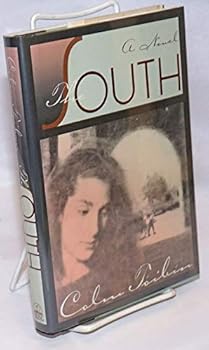The South, A Novel
Select Format
Select Condition 
Book Overview
A highly acclaimed novel from the author of Brooklyn and an "immensely gifted and accomplished writer" (The Washington Post), about an Irishwoman who creates a new life in post-war Spain. In 1950,... This description may be from another edition of this product.
Format:Hardcover
Language:English
ISBN:0670838705
Release Date:September 1991
Publisher:Viking Penguin
Length:238 Pages
Weight:1.02 lbs.
Dimensions:20.0" x 20.0" x 20.0"
Customer Reviews
3 ratings
Somber Tale
Published by Thriftbooks.com User , 14 years ago
The South, the story of an Irish woman who falls in love with a Spanish anarchist in 1950's Barcelona, is captivating but tragic. Katherine Proctor, the Irish woman, was a well developed character and, throughout the novel, I was interested in her and cared about her. Often I wondered at her decisions because her chosen life with Miguel is poverty stricken, at times violent and sometimes impossible to continue. The most fascinating aspect for me was the revelation of the complex events of the Spanish Civil War and, especially, the way Franco continued to hunt down those who had fought against his Nationalist army. The plot moves slowly, but that was not a problem for me. Overall,though, the book is a sad one; it begins this way and only becomes more so. Yet, I still feel it was valuable to read.
A painting of a painter's life
Published by Thriftbooks.com User , 15 years ago
The South by Colm Toibin is an intense, though fitful chronicle of a woman's life, a life as yet incomplete. It presents a patchwork of detail amidst vast tracts of unknown, like a painting that has a suggestion of complete outline interspersed with patches of intricate detail. Thus, eventually, we know some amazing things about Katherine Proctor and we have shared much of her life. She remains, paradoxically, largely anonymous, however, as she probably does to herself. The title carries an agenda for Katherine Proctor's life, since aspects of the word provide setting and context for phases in her life. We meet her having just left her husband and her ten-year-old son. She was unhappily married to Tom. Richard was her spitting image. We never really get to know why she left, why she so definitively broke with a past that appeared both secure and fulfilled. A part of her motives may have sprung from her status as a Protestant in Enniscorthy, a small town near the sea in the south of Ireland, in the south-east. She thus inherited a status that bore its own history, a history of which she was aware, but minus its detail. But it could only have been part of an explanation, because it was her husband and her life, her private concerns, that she fled. In the 1950s, she went south to Spain, settling in Barcelona. There she met Miguel, a man with his own history. He had fought with the anarchists in the Civil War. He still had friends, colleagues from the fight. Katherine falls for him. They move to a stone house in the Pyrenees. He paints. She paints. She bears him a child. Katherine meets Michael Graves, an Irishman, doubly coincidentally also from her home town. He is working in Barcelona. He seems to be an ailing, gently cynical character, who is clearly besotted with her. When things with Miguel turn unexpectedly sour, he offers solace and comfort. This time, however, Katherine had nothing to do with the split, a separation that also took away her young daughter. She painted more, hibernated. And then there grew an urge to trace the son she had left behind many years before. He was still in their family house, the one she had deserted, where he lived with his wife and daughter. There are tensions. They are solved. Michael Graves is also back in Ireland. Katherine rediscovers the south, her homeland, through painting it. Though penniless, she gets by, sometimes appearing to live off her own resources of passion and commitment. Though perhaps not conscious of it herself, she is always striving for a fulfilment she believes she never attains. In fact, she has it all along. Though a victim of circumstance, she is ready to grasp any opportunity and live it. "Only a protestant would go into sea so cold," Michael says to her. She gets wet. He doesn't. And in the end, though we still hardly know her, we like Katherine proctor, and we respect her. The South alternates its narrative between first and third person in a subtle way tat allows the reader
Quiet and moving
Published by Thriftbooks.com User , 21 years ago
Spare and soothing, quiet and sadly moving. I really liked this book because it was haunting - the descriptions of Spain and the sadness of a woman watching the man she loves be destroyed by the SPanish Civil War. Quite good.
The South Mentions in Our Blog

Discover Irish Authors You Must Know
Published by ThriftBooks Team • March 10, 2022
Ireland is no stranger to being home to literary legends, which may partly explain why it's referred to as "The Land of Saints and Scholars." With St. Patrick's Day quickly approaching, what better time to honor these literary legends and highlight some of the best Irish authors?





